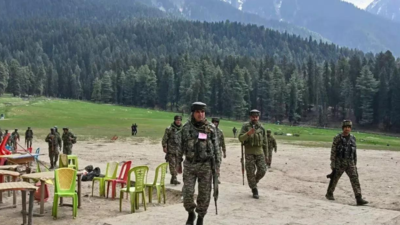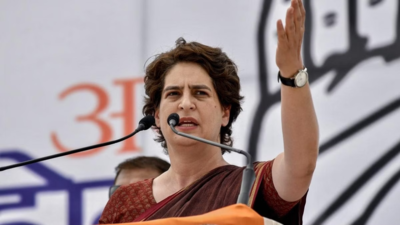Trade, water and airspace: How India put pressure on Pakistan after Pahalgam terror attack

India has launched a comprehensive strike of economic, diplomatic and logistical retaliation against Pakistan following the deadly terror attack in Pahalgam that killed 26 people, most of them tourists, on April 22. In a sharp escalation, New Delhi has rolled out a series of punitive measures targeting Pakistan’s trade, communication, maritime access and airspace, effectively severing multiple lines of engagement between the two nuclear-armed neighbours.
The clampdown includes a blanket ban on all imports from Pakistan, the suspension of mail exchanges, a prohibition on Pakistani ships docking at Indian ports, and a complete closure of Indian airspace to Pakistan-registered aircraft.
The retaliatory steps also follow India’s suspension of the Indus Waters Treaty and the closure of the Attari-Wagah land border, signalling a strategic effort to isolate Pakistan on all fronts.
Total ban on trade with Pakistan
India has implemented an immediate ban on all imports and exports with Pakistan, a drastic move outlined in the Directorate General of Foreign Trade’s (DGFT) notification on May 2. The directive prohibits the direct or indirect import or transit of any goods originating in or exported from Pakistan. This includes items that may have been routed through third countries, closing off another avenue for trade between the two nations. The decision also requires any exemptions to be approved by the government on a case-by-case basis.
The suspension will significantly impact the limited trade between the two countries, which saw India export goods worth $1.18 billion to Pakistan in the period between April 2024 and January 2025, compared to just $2.88 million in imports.
Suspension of mail and parcel services
In addition to the trade ban, India has also suspended all postal services with Pakistan. The Department of Posts issued a suspension order for the exchange of mail and parcels between the two countries via air and land routes. This action follows India’s concerns about cross-border linkages related to the terror attack.
Maritime restrictions: No entry for Pakistani ships
India has taken further steps to isolate Pakistan by banning Pakistani flagged vessels from docking at any Indian port. The new maritime restrictions also prevent Indian vessels from entering Pakistani ports. The Directorate General of Shipping (DGS) issued the directive, stressing that these measures are necessary for national security and to safeguard India’s shipping infrastructure. The new rules have been enforced with immediate effect, intensifying the already strained maritime relations between the two countries.
Pakistan retaliated by banning Indian flagged ships from entering its ports.
Airspace restrictions and diplomatic tensions
In the wake of the Pahalgam attack, India also restricted Pakistani aircraft from entering its airspace. A Notice to Airmen (NOTAM) was issued on April 30, prohibiting all Pakistani-registered aircraft, including military planes, from flying in Indian airspace until at least May 23. This move follows similar steps taken by Pakistan to bar Indian aircraft from its airspace, adding another layer of diplomatic tension between the two nations.
The suspension of airspace access has led to longer routes for airliners, particularly for flights between India and northern and western regions.
Social media blocks
In response to the rising tensions, India has also taken steps in the digital realm. India blocked 16 Pakistani YouTube channels accused of spreading misleading and provocative content about the Pahalgam attack. The banned channels, with a combined subscriber base of over 63 million, were seen as contributing to misinformation campaigns.
Additionally, India has withheld the X (formerly Twitter) accounts of Pakistan’s information and broadcasting minister, Attaullah Tarar, and defence minister, Khwaja Asif, accusing them of making inflammatory statements and spreading false information.
Instagram has blocked several Pakistani celebrities’ accounts in India. Affected stars include Fawad Khan, Atif Aslam, Mawra Hocane, and Abida Parveen, with a message citing compliance with legal restrictions. Farhan Saeed, Ali Sethi, Saba Qamar, and Adnan Siddiqui are also affected. Earlier, accounts of Mahira Khan, Hania Aamir, Sanam Saeed, and others were blocked.
Tension on border
On April 23, foreign secretary Vikram Misri had announced that Pakistani nationals are barred from using SAARC Visa Exemption Scheme (SVES) visas to enter India. Existing SVES visas were cancelled, and those currently in India were given 48 hours to leave. India also reduced the strength of both countries’ High Commissions from 55 to 30 by May 1.
The situation on the ground along the Line of Control (LoC) remains tense, with both countries engaging in cross-border exchanges of fire. Since the Pahalgam attack, Pakistani troops have initiated nightly small arms fire across multiple sectors, including Kupwara, Uri, Akhnoor, and Naushera. The Indian Army has responded proportionately.
Indus Waters Treaty and Attari border closed
India suspended the decades-old Indus Waters Treaty and shut down the Attari-Wagah border crossing.
Pakistan’s retaliatory actions
Pakistan responded promptly to India’s measures, announcing a reciprocal ban on Indian ships entering Pakistani ports. The ministry of maritime affairs in Pakistan justified its decision, citing concerns over national security, maritime sovereignty, and economic interests.
In the face of escalating tensions, Pakistan’s military also conducted a successful missile test, launching the Abdali Weapon System, a surface-to-surface missile with a range of 450 km.





